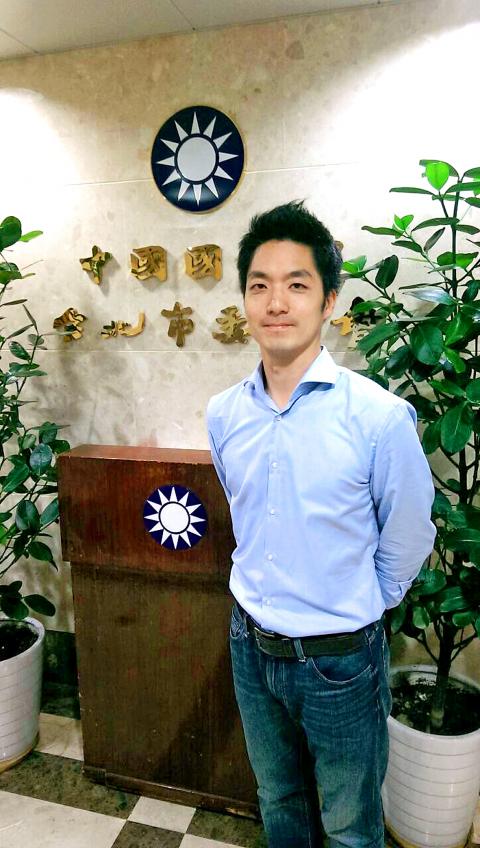Chinese Nationalist Party (KMT) Legislator Lo Shu-lei (羅淑蕾) lost the party’s legislative primary to Chiang Wan-an (蔣萬安), the son of former KMT vice chairman John Chiang (蔣孝嚴), by more than 10 percentage points.
The KMT yesterday released primary poll numbers for Taipei’s third electoral district, which covers Zhongshan (中山) and Songshan (松山) districts.
Lo, 44.624 percent of support, lost the primary to Chiang Wan-an, who held 55.376 percent.

Photo: CNA
Lo beat John Chiang in the party’s 2011 legislative primary by a small margin.
When reporters called his victory “the prince’s revenge,” Chiang Wan-an said that joining the race was his own decision, adding: “There is no such thing as a prince’s revenge.”
Lo thanked her supporters, saying the loss was "God’s will to allow her finally to rest. "
“I have not let my constituency down in the past seven years, having worked to amend laws related to people’s daily lives. I hope that I could be remembered,” she said.
She then accused the Want Want China Times Group of “systematically going after her by mudslinging and spreading rumors” because of her earlier opposition to the group’s acquisition of China Network Systems (中嘉網路).
“Who would dare tell the truth about this media group and do the right thing in the future?” she asked.
When asked whether she would run for the legislature as a non-KMT candidate, Lo said she “has much love for the KMT,” without elaborating.
Separately yesterday, KMT Legislator Liao Kuo-tung (廖國棟) called on the party center to revise the party charter to have Legislative Speaker Wang Jin-pyng (王金平) remain in the legislature as a legislator-at-large.
“It is possible for party representatives, central standing committee members or [KMT] legislators to initiate the [charter-amending] mechanism before the party congress set to take place on July 19,” Liao said.
“It would be a good combination for the KMT to secure the victory, with [KMT Chairman] Eric Chu (朱立倫) joining the 2016 presidential election and Wang staying in the legislature,” Liao added.
The KMT party charter states that a legislator-at-large could be re-elected only once. While having many years of legislative experience, Wang is currently serving his second term as a KMT legislator-at-large.

Taiwan has received more than US$70 million in royalties as of the end of last year from developing the F-16V jet as countries worldwide purchase or upgrade to this popular model, government and military officials said on Saturday. Taiwan funded the development of the F-16V jet and ended up the sole investor as other countries withdrew from the program. Now the F-16V is increasingly popular and countries must pay Taiwan a percentage in royalties when they purchase new F-16V aircraft or upgrade older F-16 models. The next five years are expected to be the peak for these royalties, with Taiwan potentially earning

STAY IN YOUR LANE: As the US and Israel attack Iran, the ministry has warned China not to overstep by including Taiwanese citizens in its evacuation orders The Ministry of Foreign Affairs (MOFA) yesterday rebuked a statement by China’s embassy in Israel that it would evacuate Taiwanese holders of Chinese travel documents from Israel amid the latter’s escalating conflict with Iran. Tensions have risen across the Middle East in the wake of US and Israeli airstrikes on Iran beginning Saturday. China subsequently issued an evacuation notice for its citizens. In a news release, the Chinese embassy in Israel said holders of “Taiwan compatriot permits (台胞證)” issued to Taiwanese nationals by Chinese authorities for travel to China — could register for evacuation to Egypt. In Taipei, the ministry yesterday said Taiwan

Taiwan is awaiting official notification from the US regarding the status of the Agreement on Reciprocal Trade (ART) after the US Supreme Court ruled US President Donald Trump's global tariffs unconstitutional. Speaking to reporters before a legislative hearing today, Premier Cho Jung-tai (卓榮泰) said that Taiwan's negotiation team remains focused on ensuring that the bilateral trade deal remains intact despite the legal challenge to Trump's tariff policy. "The US has pledged to notify its trade partners once the subsequent administrative and legal processes are finalized, and that certainly includes Taiwan," Cho said when asked about opposition parties’ doubts that the ART was

If China chose to invade Taiwan tomorrow, it would only have to sever three undersea fiber-optic cable clusters to cause a data blackout, Jason Hsu (許毓仁), a senior fellow at the Hudson Institute and former Chinese Nationalist Party (KMT) legislator, told a US security panel yesterday. In a Taiwan contingency, cable disruption would be one of the earliest preinvasion actions and the signal that escalation had begun, he said, adding that Taiwan’s current cable repair capabilities are insufficient. The US-China Economic and Security Review Commission (USCC) yesterday held a hearing on US-China Competition Under the Sea, with Hsu speaking on